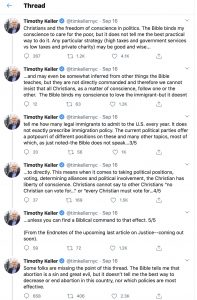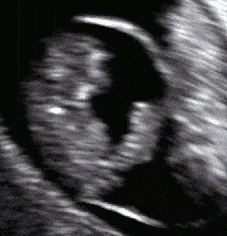Let each citizen remember at the moment he is offering his vote that he is not making a present or a compliment to please an individual – or at least that he ought not so to do; but that he is executing one of the most solemn trusts in human society for which he is accountable to God and his country.
—Samuel Adams—
Key point: When you go to the voting booth, don’t just follow your heart. Use your head. Also, align your decisions with biblical principles.
In this post, with the help of my friend Matt Travis, I want to blow apart the notion that voting for Democrats out of a concern for the poor and disadvantaged is a valid approach for Christians. I’m from North Carolina, and the North Carolina motto is Esse quam videri — Latin for “to be rather than to seem.” We live in a time when a great deal is not at all as it seems. We need discernment. We need to be as were the men of Issachar in 1 Chronicles 12:32. They “had understanding of the times, to know what Israel ought to do.”
Esse quam videri is a Latin phrase meaning “to be rather than to seem.”
Watch and listen as Matt explains glaring biblical problems with Tim Keller’s assertion that voting for Democrats is a viable option for the Christian in this election. After his presentation, I’ll follow up with several important points that summarize and reinforce what Matt said.
 This thread from Tim Keller is available here.
This thread from Tim Keller is available here.
You Can’t Be Pro-Life and Look the Other Way on Abortion
Let’s examine several principles Matt either made or that are consistent with his statement as a whole.

First, no one, and especially no Christian, can legitimately claim to be pro-life in the broad sense of caring for the poor and underprivileged without being ardently anti-abortion.
On November 20, 2019, a coalition of religious leaders released the Manhattan Declaration: A Call of Christian Conscience. It was a statement that served notice to the public, including government leaders, that life, marriage, and religious liberty were non-negotiable issues, and on those issues Christians and others who believed in moral absolutes would not compromise. Life is sacred. Marriage is and can only be between one man and one woman. Religious liberty must be respected and honored. To date, more than 550,000 individuals have signed the statement. The Manhattan Declaration is even more critical today, more than ten years after it was first released, than it was before its first signatories signed their names.
A few weeks after the drafters of the Declaration held their initial press conference — on January 13, 2010 — Chuck Colson said this in a BreakPoint commentary titled “Life and Social Justice—If Life Isn’t Sacred, Nothing Is.” Colson declared,

A few months ago, as most of you know, theologian Timothy George, Princeton scholar Robby George, and I co-authored a document called the Manhattan Declaration. Two hundred Christian leaders and hundreds of thousands of lay people have signed it online. Some younger evangelicals, however, demurred. Why limit the agenda to life, family, and religious liberty, they asked. What about social justice and the environment?
What these well-meaning folks fail to realize is that a strong pro-life commitment is absolutely essential for social justice. For 34 years I’ve gone into America’s prisons to witness to the most marginalized among us, precisely because I believe every human being is made in God’s image. When I walk through the vile-smelling cell blocks, I don’t see tattooed inmates; I see children of God.
There is not social justice, you see, without respect for the innate dignity of each human being created in God’s image.
There is not social justice, you see, without respect for the innate dignity of each human being created in God’s image.
—Chuck Colson—

While we have previously pushed back against the social justice movement by highlighting ways in which social justice contrasts to biblical justice and ways the social justice narrative stands contrary to the Christian gospel, Colson’s reference to social justice here refers to issues such as helping and caring for the poor and the underprivileged. These are, of course, concerns that are biblical and that Christians must not neglect. Yet, as Timothy Keller’s series of tweets clearly demonstrates, some Christian leaders are emphasizing compassionate help for the poor and allowing that to overshadow the importance of defending human life. Make no mistake! Defending human life is critical for the Christian. Why? As Chuck Colson has said, people are made in God’s image.
Hear video blogger A. D. Robles push back against the idea that it’s OK to overlook the issue of abortion. The complete video from which this clip was taken was posted on February 26, 2019 and is available here.

More recently — on Wednesday, September 23, 2020, in fact — Jon Harris, another video podcaster, expressed a similar idea. Jon was discussing the death of Justice Ruth Bader Ginsburg. After he said what he said in this clip, Jon shared information about a few decisions in which Justice Ginsburg had participated that he deemed to be less damaging than some others for which she is better known. Here is the video from which the following clip was taken, should you desire to hear his entire presentation.
The point here is that if you are wrong about abortion, you’re wrong about the importance of life; and if you’re wrong about life, you’re going to get other important matters wrong as well. In other words, life is a linchpin issue.
Life is a linchpin issue.
Government Isn’t Compassionate

Second, it isn’t government’s job to meet citizens’ needs. That job belongs to the people themselves. As they do, government has the primary responsibility of maintaining order by punishing those who do evil and commending or rewarding those who do good. Not everyone can work, of course; and those who can’t work need the help of others. Those who can work, however, should be expected to do so. Here are eleven Bible passages emphasizing this truth.
Benjamin Franklin wrote eloquently on this subject. I quote him here at length because so few have read these insightful words from Franklin, and everyone should.
I am for doing good to the poor, but I differ in opinion of the means. — I think the best way of doing good to the poor, is not making them easy in poverty, but leading or driving them out of it. In my youth I travelled much, and I observed in different countries, that the more public provisions were made for the poor, the less they provided for themselves, and of course became poorer. And, on the contrary, the less was done for them, the more they did for themselves, and became richer. There is no country in the world where so many provisions are established for them; so many hospitals to receive them when they are sick or lame, founded and maintained by voluntary charities; so many alms-houses for the aged of both sexes, together with a solemn general law made by the rich to subject their estates to a heavy tax for the support of the poor. Under all these obligations, are our poor modest, humble, and thankful; and do they use their best endeavours to maintain themselves, and lighten our shoulders of this burthen? — On the contrary, I affirm that there is no country in the world in which the poor are more idle, dissolute, drunken, and insolent. The day you passed that act, you took away from before their eyes the greatest of all inducements to industry, frugality, and sobriety, by giving them a dependance on somewhat else than a careful accumulation during youth and health, for support in age or sickness. In short, you offered a premium for the encouragement of idleness, and you should not now wonder that it has had its effect in the increase of poverty. Repeal that law, and you will soon see a change in their manners. St. Monday, and St. Tuesday, will cease to be holidays. SIX days shalt thou labour, though one of the old commandments long treated as out of date, will again be looked upon as a respectable precept; industry will increase, and with it plenty among the lower people; their circumstances will mend, and more will be done for their happiness by inuring them to provide for themselves, than could be done by dividing all your estates among them.1

Franklin’s statements may not sound compassionate in our day, but true compassion does not ignore or hide the truth. Remember: To be rather than to seem! One truth we must remember is that government is not compassionate. Indeed, it cannot be. Government is bureaucracy.
Furthermore, we must be wary of politicians (and there are many) who use the poor for their own political advantages. The more dependent people are on government, the more powerful those who are seen as the sources of goods and resources become. In these situations, government becomes god, and incentives to work and produce for oneself and one’s family are hindered or eliminated.
Property Rights Are Essential
Third, property rights are essential if incentives to work are to be maintained and if freedom and liberty are to be preserved. In a previous series of articles, I listed ten ways the free enterprise economic model aligns with biblical teachings. (I would encourage you to read the entire series to get a broad understanding of this important topic.) The seventh and eighth items are as follows.
-
-
- “[T]he right to hold property” is an inherent, God-given right and a principle on which the United States of America was founded. We see property rights affirmed in numerous places in Scripture. The Eighth and Tenth Commandments (Ex. 20:15,17) are foundational biblical principles for property rights.
- “[T]he right to exchange what one owes for something else” is another linchpin principle making capitalism work. Moreover, we see it clearly in the Bible—in many places.
-
It is the belief of many social-justice-minded individuals today that compassion for the poor demands that government intervene and level the playing field between the rich and the poor through taxation and redistribution of wealth. This is socialism, and it doesn’t work. Eventually — sooner rather than later — everyone is living in poverty. Just look at what happened to Venezuela.
We’ve already noted that government is not compassionate. It isn’t effective, either. Writing for the Foundation for Economic Education, Daniel J. Mitchell makes the case that “Poverty in the U.S. Was Plummeting—Until Lyndon Johnson Declared War On It.” These videos — here and here — provide some extremely helpful additional information.
We also need to say that socialism eliminates charity and generosity. If something is forced, it isn’t voluntary, and it can’t be generous or charitable. This leads us to our next point.
Let Individuals and Charitable Organizations Help the Poor
Fourth, from a biblical perspective, help for the poor is to come voluntarily from individuals, as well as organizations formed voluntarily by individuals to give those in need real help (see pages 24-27 of this publication). For Christians, this doesn’t simply mean helping the poor only if you want to. It is every believer’s responsibility to be involved in one way or another helping to meet the needs of those who cannot fend for themselves.

Fifth, people who are burdened for the poor shouldn’t wait for government to take away their wealth and give it to those deemed to be in need. They should roll up their sleeves and become personally involved in helping them! They should give their money to credible organizations that genuinely assist those who lack or who otherwise are in need rather than waiting for government to redistribute money coercively.
Mark it down. Government cannot give its own money away; instead it must take from those who have wealth and give it to others, even though it isn’t theirs to give. Even so, with this scenario the government is seen as the great benefactor. As we said earlier, it becomes god in the eyes of those who receive the “help.” Such practices foster an unhealthy and unrealistic dependance on the state.
Let’s Review
-
-
- No one, and especially no Christian, can legitimately claim to be pro-life in the broad sense of caring for the poor and underprivileged without being ardently anti-abortion.
- It isn’t government’s job to meet citizens’ needs. That job belongs to the people themselves.
- Property rights are essential if incentives to work are to be maintained and if freedom and liberty are to be preserved. Please read the series of articles titled “The Bible and Free Enterprise.”
- From a biblical perspective, help for the poor is to come voluntarily from individuals, as well as organizations formed voluntarily by individuals to give them real help.
- People who are burdened for the poor shouldn’t wait for government to take away their wealth and give it to those deemed to be in need. They should roll up their sleeves and become personally involved in helping them!
-
For these reasons as well as others, the approach of the Democrat Party, which stands unyieldingly opposed to the above biblical principles, should be soundly rejected at the voting booth.
No biblical justification for voting for Democrats exists.
Copyright 2020 by B. Nathaniel Sullivan. All rights reserved.
Unless otherwise indicated, Scripture has been taken from the New King James Version®. Copyright © 1982 by Thomas Nelson, Inc. Used by permission. All rights reserved.
top image credit: Photo by Josh Carter on Unsplash
Notes:
(For more information, go here and here.)
2The Wikipedia article on Benjamin Franklin states, “Benjamin Franklin, in his capacity as a farmer, wrote at least one critique about the negative consequences of price controls, trade restrictions, and subsidy of the poor. This is succinctly preserved in his letter to the London Chronicle published November 29, 1766, titled ‘On the Price of Corn, and Management of the poor’.”

Be First to Comment